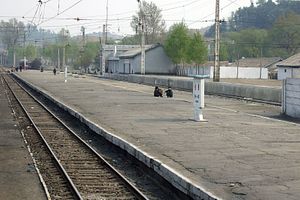On Friday, North and South Korea began a 16-day survey of railways along the northern portion of the Korean Peninsula. The initiative is part of this year’s ongoing inter-Korean collaboration projects.
The survey process began with a South Korean train carrying an inspection team into North Korea on Friday. The train crossed the military demarcation line (MDL), which has separated the two Koreas since the signing of the Korean War armistice in 1953. The crossing marked the first of its kind in 10 years.
The survey will cover two rail corridors in North Korean territory, one on the country’s eastern side and another along the western coast. First, the two sides will survey a section of the line connecting Kaesong, a North Korean city near the MDL, and Sinuiju, a city near the Chinese border. That survey is slated to be completed by December 5, according to the South Korean Unification Ministry. Thereafter, the two sides will survey a longer portion of the railway network connecting Mount Kumgang, a popular tourist destination in North Korea, and the Tumen river, along the eastern portion of the China-North Korea border.
Last weekend, South Korea announced that the United Nations Security Council sanctions committee on North Korea had granted an exemption allowing for the joint survey to take place.
“The sanctions exemption has big implications given that the project has garnered recognition and support from the United States and the international society,” South Korea’s presidential spokesperson Kim Eui-kyeom said at the time.
While the United States allowed for the exemption, Washington is unlikely to support the further delivery of benefits to North Korea as far as plans for an inter-Korean rail connection are concerned. Marc Knapper, the acting deputy assistant secretary for Japan and South Korea, said this week that the actual lifting of sanctions that would allow projects to proceed on a permanent basis could only come after North Korea’s “final, fully verified denuclearization.”
“I think the international community has made very clear that this kind of concrete progress will not occur absent real progress on denuclearization,” Knapper said, speaking at a forum in Seoul. “That’s the reality of the situation.”
The beginning of the inter-Korean rail survey marks a significant step in this year’s economic cooperation projects and comes ahead of a possible visit to Seoul by North Korean leader Kim Jong Un for what would be this year’s fourth inter-Korean summit.
The summit may take place as soon as December 13-14, but North Korea has expressed concerns about security arrangements in that time. The administration of South Korean President Moon Jae-in appears determined to host Kim in Seoul before the end of the year.
The South Korean presidential office noted this week that the possibility of the summit occurring before the end of the year remains a possibility. “We are discussing (the issue) with all possibilities open. Nothing has been decided,” Blue House spokesperson Kim Eui-kyeom told reporters, according to South Korea’s Yonhap News Agency.

































